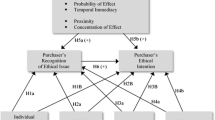Abstract
While there have been many studies of the ethical behavior ofmanagers, little research investigated the ethical beliefs andideologies of consumers. Moreover, even less is known about therelationship between consumer beliefs and ideology and purchasingbehavior. The present study investigates the extent to whichconsumers punish or reward what they perceive as either a firm'sethical or unethical behavior. The research model was tested onsamples of Israeli and Turkish respondents. The results indicatethat personal economic benefit, ideology (idealism versusrelativism), economic cost to others and locus of control explainconsumer reaction to ethical, purchasing dilemmas. Moralexpectations did not influence whether a consumer would purchasein a store offering an unethical proposition. Apparently,material gain, if large enough, outweighs one's moralpredisposition. Idealists were found to be less likely topurchase in an unethical store situation. The Turkish respondentswere more concerned with economic cost to others than the Israelirespondents, apparently owing to cultural differences between thetwo groups. Finally, those respondents having higher internallocus of control were found to be more ethical.
Similar content being viewed by others
REFERENCES
Bartels, R.: 1967, 'A Model for Ethics in Marketing', Journal of Marketing (January) 31, 20-26.
Ekin, M.G. and S. Tezölmez: 1999, 'Business Ethics in Turkey: An Empirical Investigation with Special Emphasis on Gender', Journal of Business Ethics 18, 17-34.
Engel, J. F. and R. D. Blackwell: 1982, Consumer Behavior, The Dryden Press, New York.
Ferrel, O. C. and L. G. Gresham: 1985, 'A Contingency Framework for Understanding Ethical Decision Making in Marketing', Journal of Marketing (Summer), 87-96.
Forsyth, D. R.: 1980, 'A Taxonomy of Ethical Ideologies', Journal of Personality and Social Psychology 39(1), 175-184.
Forsyth, D. R.: 1992, 'Judging the Morality of Business Practices: The Influence of Personal Moral Philosophies', Journal of Business Ethics (May) 11, 461-470.
Franke, G., D. Crown and D. Spake: 1997, 'Gender Differences in Ethical Perceptions of Business Practices', Journal of Applied Psychology (December) 82, 920-934.
Fullerton, S., K. B. Kerch and H. R. Dodge: 1996, 'Consumer Ethics: An Assessment of Individual Behavior in the Market Place', Journal of Business Ethics 15, 805-814.
Hofstede, G.: 1980, Cultures Consequences: International Differences in Work-Related Values, Sage, Beverly Hills, CA.
Hunt, S. and S. Vitell: 1986, 'A General Theory of Marketing Ethics', Journal of Macromarketing (Spring), 5-16.
Izraeli, D.: 1988, 'Ethical Beliefs and Behavior Among Managers: A Cross-cultural Perspective', Journal of Business Ethics 7, 263-271.
Jones, T.: 1991, 'Ethical Decision Making by Individuals in Organizations: An Issue-Contingent Model', Academy of Management Review 16(2), 366-395.
Puto, C. P.: 1987, 'The Framing of Buying Decisions', Journal of Consumer Research (December) 14, 301-315.
Rallapalli, K. C., S J. Vitell, F. A. Wiebe and J. H. Barnes: 1994, 'Consumer Ethical Beliefs and Personality Traits: An Exploratory Analysis', Journal of Business Ethics 13, 487-495.
Rawwas, M. Y. A.: 1996, 'Consumer Ethics: An Empirical Investigation of the Ethical Beliefs of Austrian Consumers', Journal of Business Ethics 15, 1009-1019.
Rawwas, M. Y. A., G. L. Patzer and S. J. Vitell: 1998, 'A Cross-Cultural Investigation of the Ethical Values of Consumers: The Potential Effect ofWar and Civil Disruption', Journal of Business 17, 435-448.
Reidenbach, R. D. and P. Forest: 1996, 'The Perceived Importance of an Ethical Issue as an Influence on the Ethical Decision-Making of Ad Managers', Journal of Business Research (January) 35, 179-186.
Rotter, J. B.: 1973, 'Rotter's Internal-External Locus of Control Scale', in J. Robinson (ed.), Measures of Social Psychological Attitudes Survey Research.
Schlegelmilch, B. B. and D. C. Robertson: 1995, 'The Influence of Country and Industry on Ethical Perceptions of Senior Executives in the U.S. and Europe', Journal of International Business Studies, 859-881.
Singhapakdi, A., S. Vitell and G. Franke: 1999, 'Antecedents, Consequences, and Mediating Effects of Perceived Moral Intensity and Personal Moral Philosophies', Journal of the Academy of Marketing Science 27(1), 19-36.
Smith, N. C.: 1990, Morality and the Market: Consumer Pressure for Corporate Accountability, Routledge, New York.
Smith, N. C. and E. Cooper-Martin: 1997, 'Ethics and Target Marketing: The Role of Product Harm and Consumer Vulnerability', Journal of Marketing (July) 61, 1-20.
Strutton, D., L. E. Pelton and O. C. Ferrel: 1997, 'Ethical Behavior in Retail Settings: There is a Generation Gap', Journal of Business Ethics 16, 87-105.
Swinyard, W. R., T. J. Delong and P. S. Cheng: 1989, 'The Relationship Between Moral Decisions and Their Consequences: A Tradeoff Analysis Approach', Journal of Business Ethics 8, 289-0297.
Trevino, L. K.: 1986, 'Ethical Decision Making in Organisations: A Person-Situation Interactionist Model', Academy of Management Review 11(3), 601-617.
Vitell, S. J., R. Lumpkin and M. Y. A. Rawwas: 1991, 'Consumer Ethics: An Investigation of the Ethical Beliefs of Elderly Consumers', Journal of Business Ethics 10, 365-375.
Vitell, S. J. and J. Muncy: 1992, 'Consumer Ethics: An Empirical Investigation of Factors Influencing Ethical Judgements of the Final Consumer', Journal of Business Ethics 11, 585-597.
Vitell, S. J., S. L. Nwachukwu and J. H. Barnes: 1993, 'The Effects of Culture on Ethical Decision-Making: An Application of Hofstede's Typology', Journal of Business Ethics 12, 753-760.
Walters, G. C.: 1978, Consumer Behavior: Theory and Practice, 3rd edn., Richard D. Irwin, Inc., Homewood, IL.
Whalen, J., R. E. Pitts and J. K. Wong: 1991, 'Exploring the Structure of Ethical Attributions as a Component of the Consumer Decision Model: The Vicarious Versus Personal Perspective', Journal of Business Ethics 10, 285-293.
Wilkes, R. E.: 1978, 'Fraudulent Behavior by Consumers', Journal of Marketing (October), 67-75.
Author information
Authors and Affiliations
Rights and permissions
About this article
Cite this article
Nebenzahl, I.D., Jaffe, E.D. & Kavak, B. Consumers' Punishment and Rewarding Process via Purchasing Behavior. Teaching Business Ethics 5, 283–305 (2001). https://doi.org/10.1023/A:1011445922260
Issue Date:
DOI: https://doi.org/10.1023/A:1011445922260




